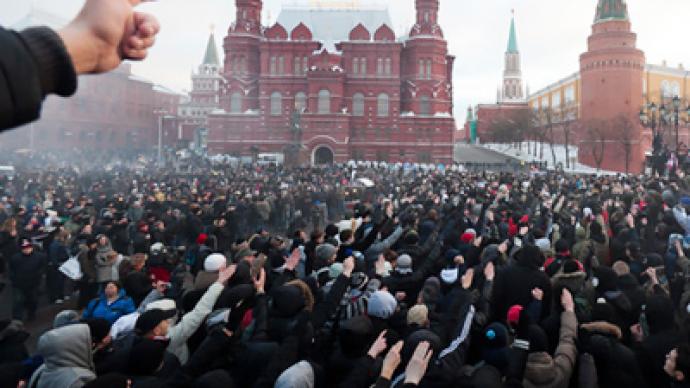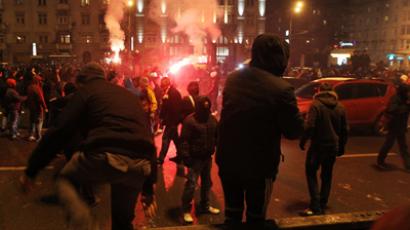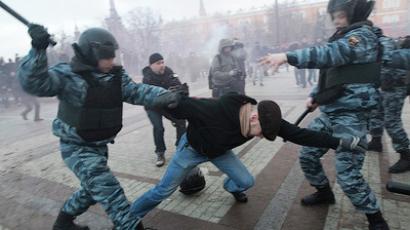Corruption seen as real reason for Moscow nationalist riots

Mass riots that started in the center of Moscow on Saturday must be blamed on corrupt police rather than nationalist sentiment in society, Russian observers and experts agreed.
A gathering of thousands of football fans to mourn their comrade killed in a street fight with men from the Northern Caucasus, ended in riots and racist attacks on Saturday. However, police, politicians and observers alike say the riots showed society’s anger over police corruption rather then general xenophobia. Saturday’s rally was organized by members of the Fratria group – supporters of Spartak Moscow FC – who are true football fans, known for their passion for sport, not fights, and have no political agenda. One of their leaders, Egor Sviridov, was shot dead, allegedly by a man from the Southern Russian republic of Kabardino-Balkaria, just over one week ago. The suspected attacker and others believed to have been involved in the fight were detained, but police released them after numerous members of the North Caucasus diaspora arrived at the police station. The suspects immediately fled and had to be put on a wanted list.The actions of the police outraged the friends and relatives of the victim. A peaceful mourning march was held on Moscow’s Leningradsky Prospect the day after the killing. Riot police were dispatched to the site after the demonstrators blocked traffic, but no clashes took place. The police commander persuaded the crowd to disperse.Another meeting was called after Sviridov’s burial. The majority of Fratria members gathered for a peaceful meeting in the north of the city where the murder took place, but several thousand people rallied in the city center, heading to Manezhnaya Square, right near the Kremlin.Many more people attended Saturday’s rally, because it was at the weekend, because the supporters’ community negotiated the gathering with the authorities and simply because lots of people knew about it. The message had been spreading on the internet for several days. Saturday’s gathering was not only attended by football fans, but also by members of other communities – from bikers to radical nationalists, though few in number. However, even a few radicals were enough to provoke rage in the crowd – someone attacked some passers-by, whose appearance they deemed ‘not Slavic enough’, the police intervened to save the victims and soon demonstrators started throwing bottles, pieces of ice and burning flares. Officers responded with truncheons and tear gas, clearing the square. A few fights broke out in the subway, but they were also quickly suppressed. Police reported that only a few officers were injured in the clashes – all of them with light bruises to the hands. Law enforcers also showed relative tolerance toward those detained during the riots – all of them were released the same day after some words of warning.Interior Minister Rashid Nurgaliyev was quick to blame the outburst of violence on leftist extremists. However, this version was neither proved nor repeated later and was probably just said in a hurry. President Dmitry Medvedev said that those responsible for the rioting would be found and punished, but the president did not point the finger at any person or movement. Nationalist organizations on Monday issued a news release offering condolences to all those who suffered at the hands of the rioters and also with a clear statement and a list of demands. The first of these demands was to bring to justice those police officers who released the three suspects in the death of Egor Sviridov. The statement also said that the authorities should pay attention to corruption in law enforcement and the ties between ethnic criminal groups and the police. There was also a demand that the authorities should stop viewing Russian nationalists as extremists and their organizations should be given broader political powers.Interestingly, most journalists and popular bloggers who commented on the event expressed very similar opinions. Everyone agreed that Russian society is tired not of newcomers, but of the arbitrariness of corrupt policemen. The widely quoted article by columnist Dmitry Sokolov-Mitrich called for a “zero tolerance” policy towards representatives of North Caucasus peoples, but it was clear that this was only to mend the current situation in which ethnic criminal clans have police on their payroll. Even members of national diasporas, including people from the Caucasus, said that most of the blame for Saturday’s riots lies on corruption in police ranks. Tigran Tvadian, the chief editor of the Yerkramas newspaper that publishes news for the Armenian diaspora told the Russian news agency RIA Novosti that the responsibility for the events in Moscow must lie on the law enforcement system that still cannot ensure the citizens’ trust in itself. “The fact that the incident turned into an action with nationalist subtext should be blamed on law enforcement bodies that cannot show society that they can be trusted,” the journalist said. At the same time, some political analysts noted that such development was still dangerous. Political adviser Marat Gelman told Vedomosti daily that Saturday’s events showed that the danger was in the very fact that street violence had become possible. “Organized groups of people appear who think that they have the right to enforce justice. In essence, after getting a license for this from a weak state,” Gelman said. On Monday, more calls for rallies appeared on the internet, urging action on December 15. However, both football fans and Russian nationalists distanced from these calls, saying that Saturday’s rallies were enough and they hoped that the authorities would pay attention to their demands. In part at least, they were right – according to news reports, all three suspects in the killing of Egor Sviridov were back in custody on Sunday.














